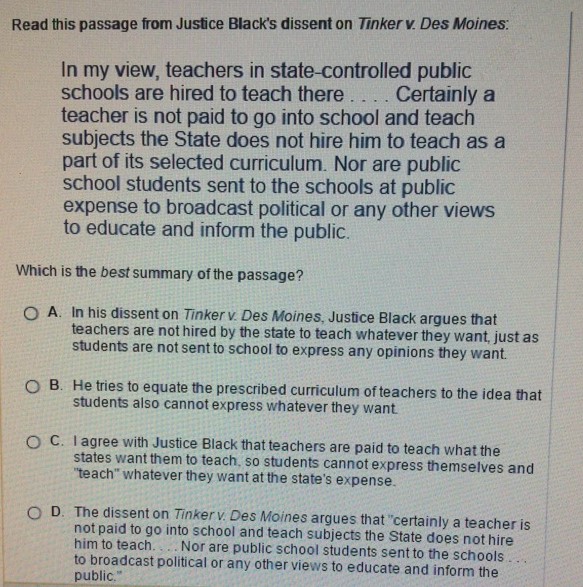QQuestionAnatomy and Physiology
QuestionAnatomy and Physiology
# Read this passage from Justice Black's dissent on Tinker v. Des Moines:
In my view, teachers in state-controlled public schools are hired to teach there . . . . Certainly a teacher is not paid to go into school and teach subjects the State does not hire him to teach as a part of its selected curriculum. Nor are public school students sent to the schools at public expense to broadcast political or any other views to educate and inform the public.
Which is the best summary of the passage?
O A. In his dissent on Tinker v. Des Moines, Justice Black argues that teachers are not hired by the state to teach whatever they want, just as students are not sent to school to express any opinions they want.
O B. He tries to equate the prescribed curriculum of teachers to the idea that students also cannot express whatever they want.
O C. I agree with Justice Black that teachers are paid to teach what the states want them to teach, so students cannot express themselves and "teach" whatever they want at the state's expense.
O D. The dissent on Tinker v. Des Moines argues that "certainly a teacher is not paid to go into school and teach subjects the State does not hire him to teach. . . . Nor are public school students sent to the schools . . . to broadcast political or any other views to educate and inform the public."
Attachments

6 months agoReport content
Answer
Full Solution Locked
Sign in to view the complete step-by-step solution and unlock all study resources.
Step 1Let me help you analyze this passage and select the best summary.
Step 2: Understand the Context
Justice Black's dissent is from the landmark Tinker v. Des Moines case, which involved student free speech rights in public schools. His passage emphasizes strict limitations on what teachers and students should do in public schools.
Final Answer
Option A is the most accurate summary of Justice Black's dissent.
Need Help with Homework?
Stuck on a difficult problem? We've got you covered:
- Post your question or upload an image
- Get instant step-by-step solutions
- Learn from our AI and community of students